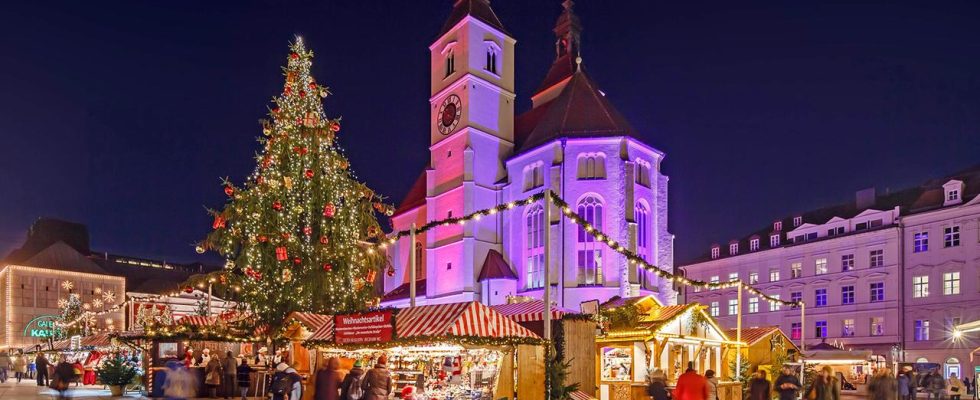In the city centers it smells of punch and bratwurst and Christmas carols are playing. But despite all the coziness: things will also be more expensive at some Christmas markets this year.
The Regensburg Christmas market is already in full swing. The market opened at the end of November, this year – for the first time in a long time – with Christ Child, but without music. The reason: the GEMA costs are too expensive for the city.
16,000 instead of 2,500 euros for Christmas music
The news from Regensburg caused a stir: Instead of around 2,500 euros as before, the city should have paid around 16,000 euros – to the Society for Musical Performance and Mechanical Reproduction Rights, better known under the acronym GEMA.
The reason: GEMA calculates the costs based on the entire Christmas market area. The city had previously only specified the space directly in front of the stage, not the entire venue. Cost: around 2,500 euros. However, if calculated correctly, the music program would cost around 16,000 euros, according to GEMA.
Judgment of Federal Court of Justice
GEMA, based in Munich, announced that there were no fee increases for Christmas markets. The tariff was last negotiated with the Federal Association of Music Organizers in 2018. GEMA itself does not set tariffs, but always negotiates them with industry associations.
Nothing has changed in the assessment basis either. GEMA refers to a ruling by the Federal Court of Justice (BGH) in 2011: In it, GEMA must use the entire event area for the use of music at Christmas markets and not the area in front of the stage with sound.
Many individual solutions
According to its own statement, GEMA has found individual solutions in almost all markets. There are a total of 3,350 stores nationwide; Only 35 were unable to reach an agreement, including the Regensburg Christmas market.
The now recalculated sum would have had to be passed on to the stand operators and ultimately the visitors. The city decided against this and therefore decided against a music program. According to Reinhard Kellner, the market manager, this type of calculation does not work in many respects. “If children play with their recorders for 20 minutes, it costs me around 600 euros – that’s not affordable,” says Kellner. For next year it will be necessary to check what will happen with the music program.
Markets “economically relevant events”
Nadine Remus is GEMA’s head of communications. What annoys her about the debate is that it gives the impression that the Christmas markets are “charitable events”. “Christmas markets are also a strong economic factor.” The large markets are “economically relevant events”.
GEMA further argues that almost every visitor to Christmas markets consumes or buys something. The music in the markets creates the appropriate atmosphere and is therefore a relevant sales factor. “Songs and musical works are used for this, which in turn are composed and written by people, i.e. created through performance. We therefore ask: If the performance of the composers and lyricists is worth nothing, should the authors give away their intellectual property?” says Remus .
Straubing plays Christmas music
Things look different than in Regensburg, almost 50 kilometers away in Straubing in Lower Bavaria: the Christmas market has already opened here too – with music. The city pays around 25,000 euros for the music program on the market. One half goes to GEMA, the other half to live musicians. The music here is financed, among other things, by the space rents from the stall operators.
Andreas Pfeffer, the vice president of the Federal Association of Showmen and Marketers, is behind the counter in Straubing. The operators in Straubing tried to only pass on the bare minimum price increases to visitors, he says.
Inflation is also making itself felt
But they can’t completely avoid it here either: “The Christmas market is somewhat spared from inflation this year, not 100 percent, but to a large extent,” says Pfeffer. Specifically: Mulled wine is available here for between four and five euros.
Whether with music or without: the general increase in prices is also noticeable in Regensburg. Walter Metzger is the spokesman for the market feeders and has been a stand operator himself for nine years. He stands behind the city in its decision against the music program. Nevertheless, he can’t avoid a price increase at his organic stand this year: “For the first time in nine years, we increased our prices by 50 cents.” The mulled wine will now cost four euros instead of 3.50 euros.

